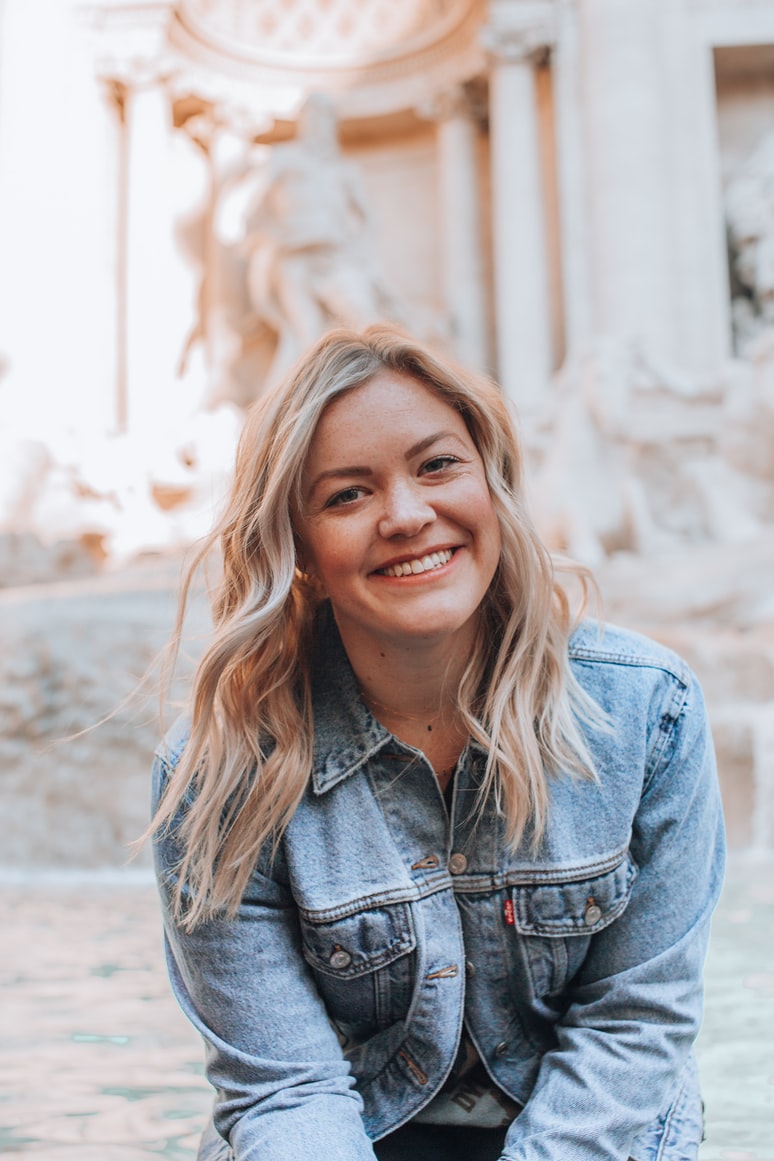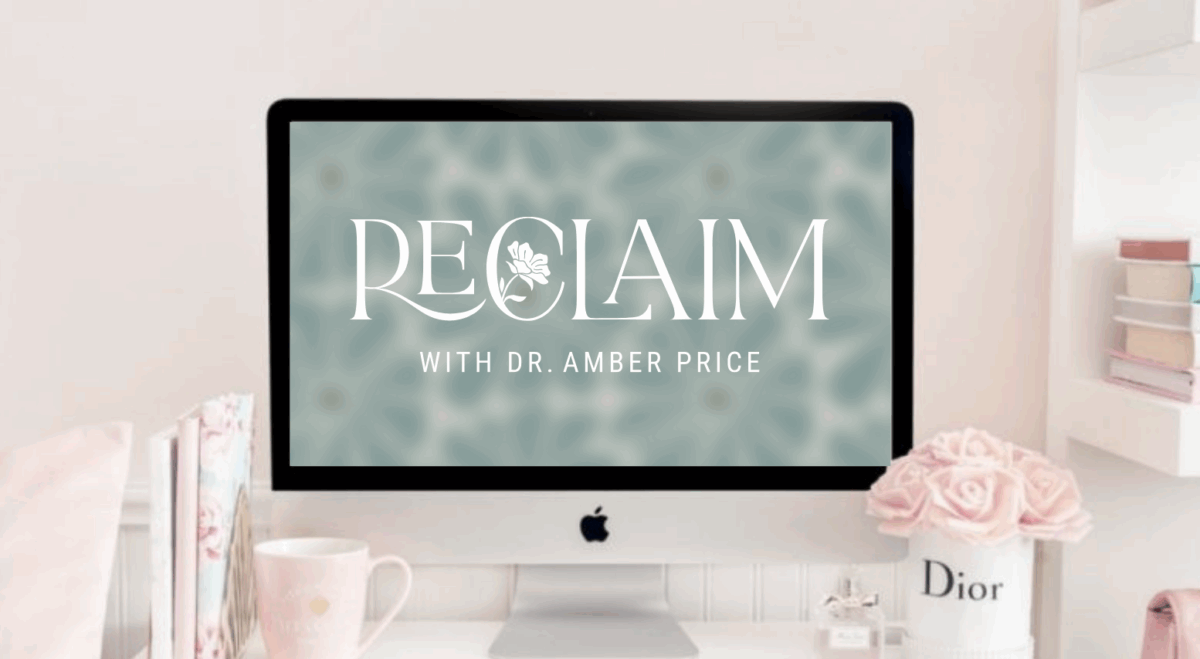Summary: It’s so easy, especially as moms, to take ownership of everyone else’s moods or challenges. It’s crucial though to take responsibility for the only person you really CAN have responsibility for, YOU! As you do this, your relationships with your family will get better.
It was a Saturday afternoon a few years ago and I was mopping my kitchen floor. I’m not totally sure why this moment is so vivid to me, but I remember I was frustrated with my kids because they were being grumpy. More specifically though, I was feeling like someone was always grumpy or needy or whiny. (With four kids, this is almost always true.)

What stands out in my memory about that day though is that I realized that I was only allowing myself to be happy when all the stars aligned, and everyone else was in a good mood or treating me nicely. This applied not only to my kids, but to my husband and friends too. Somehow, I was always waiting for that magic moment when everyone was pleasant and content so that I could be too.
And it happened!
But only once in a while…
As you probably know, it’s not often that everyone is happy, no one is moody or hungry or angry that they have to do their chores. It’s a rare moment when no one is stressed or sick or upset about something. It struck me in that moment that *I* was taking ownership for everyone else’s mood, and it wasn’t working. It was making *me* grumpy and irritable because I couldn’t just settle into my own happiness. That doesn’t work out great.
I can’t control the mood of my kids. In fact, sometimes when I am in my best parenting moments and being an amazing mom, they still are grumpy. I cannot change that.
On the flip side, there are times (ahem—more than I maybe care to acknowledge) in my life, in my marriage, in my relationships, when I’ve tried to put my own angst on someone else. Or when there’s been conflict in my life and my inclination is to point fingers and blame the problem on someone else.
“Well, I could stop nagging and be a nicer mom if you’d stop leaving messes everywhere!”
Or “It’s not MY fault that we’re in a fight. It’s because YOU didn’t unload the dishwasher like you said you would and now I have to do it and I’m tired and frazzled and it’s all your fault.”
Or “I would be a better friend to you if you’d just…(fill in the blank).”
Sound familiar to you? I think we’ve all probably had experiences on both sides of this—taking responsibility for other people’s moods or choices and on the flip side, trying to make other people responsible for ours. And frankly, it doesn’t feel that great. It feels much better when we take ownership of ourselves, see who we are clearly (strengths and flaws), and own who we are without trying to own who others are.
What Every Human Really Needs
A few decades ago, a couple of researchers[1] started talking about 3 things that every person needs in order to really thrive and feel happy in life. (These are of course beyond the basics of survival like food, water, and air.) These 3 needs are:
- Autonomy. This means being able to choose for yourself how you act, what you do with your time, and who you are. You are in control of you.
- Competence. Meaning you feel capable in the things you are doing and like you can be successful in your endeavors, whatever those are.
- Relatedness. We all want to belong and be connected to other humans and will seek out those connections. We are happiest when we feel love in our lives.
These three needs are closely intertwined. If you falter on one, it’s likely the others will suffer for you as well. There is lots of research to back this theory (it’s called self-determination theory) in just about every domain of human living. (School,[2] business,[3] relationships,[4] and physical[5] and mental health.[6])
Basically, it’s really important to feel like you get to be you, to feel like you’re a capable human, and to feel loved. Not surprising, is it? So what does this have to do with taking ownership of yourself?
Autonomy is a key ingredient in feeling fulfilled and happy in life and goes hand in hand with authenticity. Someone who feels like they get to choose who they are (in other words, feels autonomous) also feels free to be authentic, or to let others see who they really are This also helps her feel more competent at the things she’s doing and build better relationships in her life.
Owning who you are matters a lot.
What Does This Look Like In Real Life?
A friend told me about an experience she had a couple of years ago that really highlights to me the importance of developing a strong sense of self (or in other words, a feeling of autonomy & authenticity) in order to improve relationships.
This friend had a husband and a bunch of kids at home and in the midst of all that comes with raising a family, she was struggling with the feeling that she’d lost herself, or who she once believed she was, in the roles of being a wife and a mother.

That’s easy to do—she certainly wasn’t alone in this!
She felt that there were certain expectations that she had to live up to (clean house, kids that are always well-behaved, healthy meals, carpools to run, laundry to do, you know the drill) and perhaps that her husband’s needs and desires were more important, or at least more socially accepted, than her own.
Or in other words, all of her time was going towards taking care of everyone else and trying to keep everyone else happy. She felt like she was failing at what she was trying to do and drowning in all the pressure. And frankly, she wasn’t very happy, and her mental health was plummeting. (If this sounds familiar, that’s because this is really common for women.)
We are socialized to believe that it’s our job to take care of everyone and so we often silence our own needs in order to prioritize those of others. This is closely associated with depression in women.[7])
Recognizing how much she was struggling, she went to a therapist who counseled her that to solve her problems, she should attach herself more strongly to her husband. In other words, lean into that relationship even more than she already was.
Luckily, this advice sounded problematic to her. If anything, she was resenting the lack of self she felt like she had, and this advice felt like losing even more of herself. So instead of following that advice, she sought out a different therapist who helped her develop who she is, and she began to work on strengthening her sense of self and her authenticity. For her, this has looked like carving out some alone time each week to meet a friend for lunch or to run errands without little ones in tow. It’s also meant purchasing a business and running it from home so that she feels like she has something that fulfills her that she can dedicate her time to (along with caring for her family). And she learned to stand up for her own needs a little better in her marriage and her family.

This doesn’t mean she’s turned her back on her family or her marriage. There are still plenty of demands on her time and lots of needs to fulfill and raising a large family is still hard. BUT, she feels like she’s more comfortable with who she is and like she has ownership of that person. And that makes the relationships in her life so much better. It’s not taking a step away from those relationships, it’s taking a step towards bringing her best self to those relationships. And that makes all the difference.
Owning You and Only You
That’s just one example of taking ownership of yourself (but only yourself) and how that can make a difference. I’ve certainly had to learn (and keep having to learn) to do this too. So how do you actually do this in your life? What does it look like to own yourself and not own anyone else? There are a few key points:
Be Willing to Self-Confront
When something challenging comes up, so often it’s easy to see the blame that others hold for what’s happening. And frankly, in a lot of cases, you’re probably right. The things that you are seeing that the other person did, he or she probably did.
But you can’t change that.
You are the only one you can change, so it does no good to point fingers. Because the other truth is that you probably hold some of the blame, right? So what if instead of looking at what someone else did wrong, you looked at yourself and honestly asked how you contributed to the problem. What it might be like from the other person’s perspective. What you might need to change to remedy the situation.
My husband has gotten really good at this lately and I’ll tell you, it’s very disarming in the middle of a conflict when he openly and thoughtfully admits his part in it. (And I mean without me even saying “well you did this…”) And it’s very impressive and as you can imagine, moves us to a place of resolving the conflict much faster.
Here are some questions to consider about how you can self-confront a little bit more:
- What am I pretending to not see about myself that might be hindering my relationship?
- Am I willing to take a close look at myself and confront areas of needed growth and change?
- What is one thing that I can begin to confront in myself today in order to make my relationship stronger?
Know You Have Faults and Be OK with That
Along those same lines, recognize that you have faults. And then recognize that that’s ok!

We all have faults and weaknesses—it’s part of being human and if we didn’t, no one would want to be partnered with us anyway. That would be way too intimidating! It’s our weaknesses that can connect us and bring us together in meaningful ways. When you don’t acknowledge your challenges or try to shield others from seeing your flaws, you put up a wall and hinder your own capacity for intimacy.
When you see your faults, give yourself grace and acknowledge that to be human is to have weakness, and then try to grow and change in needed ways, you open yourself up to deeper connection.
Allow Others to do the Same
A few years back I was in my aunt and uncle’s house, and I noticed a little decorative sign that really caught my attention. It said: “We are responsible to our kids; we are not responsible for our kids.” (Incidentally, a friend recently told me she’d seen the same saying but with spouse replacing the word kids.)
Stop and think about that for a minute. As a mother and as a wife, I am responsible to love and care for and support my family members every day of my life. And I am so glad that I get that opportunity.
But what I can’t do is make their choices for them. I can’t change the path they choose. Only they can do that. And even as I give all the love and support I can and try my absolute best to be the wife and mother I want to be, I then need to give them space to be the person they want to be.
I cannot and should not take ownership for their choices.
No one wants to be stifled like that anyway. And it’s incredibly liberating to step away from feeling like you’ve got to own everyone else’s choices, moods, and outcomes.
It’s also liberating to start to take ownership of who you are. I don’t find myself resentfully mopping the floor as often anymore (I’m not perfect at this though). I’ve learned to be a little better just being me—flaws and all—and I’m working on letting others be them.
It’s a process, but it’s a good one.
References
[1] Deci, E. L., & Ryan, R. M. (2012). Self-determination theory. In P. A. M. Van Lange, A. W. Kruglanski, & E. T. Higgins (Eds.), Handbook of theories of social psychology (pp. 416–436). Sage Publications Ltd.
[2] Reeve, J. (2002). Self-determination theory applied to educational settings. Handbook of self-determination research, 2, 183-204.
[3] Gagné, M., & Deci, E. L. (2005). Self‐determination theory and work motivation. Journal of Organizational behavior, 26(4), 331-362.
[4] Ryan, R. M., & Deci, E. L. (2017). Relationships motivation theory: The self in close relationships. Self-determination theory: Basic psychological needs in motivation, development, and wellness, 293-318.
[5] Ng, J. Y., Ntoumanis, N., Thøgersen-Ntoumani, C., Deci, E. L., Ryan, R. M., Duda, J. L., & Williams, G. C. (2012). Self-determination theory applied to health contexts: A meta-analysis. Perspectives on Psychological Science, 7(4), 325-340.
[6] Bartholomew, K. J., Ntoumanis, N., Ryan, R. M., Bosch, J. A., & Thøgersen-Ntoumani, C. (2011). Self-determination theory and diminished functioning: The role of interpersonal control and psychological need thwarting. Personality and Social Psychology Bulletin, 37(11), 1459-1473.
[7] Jack, D. C. (1991). Silencing the self: Women and depression. Harvard University Press.



